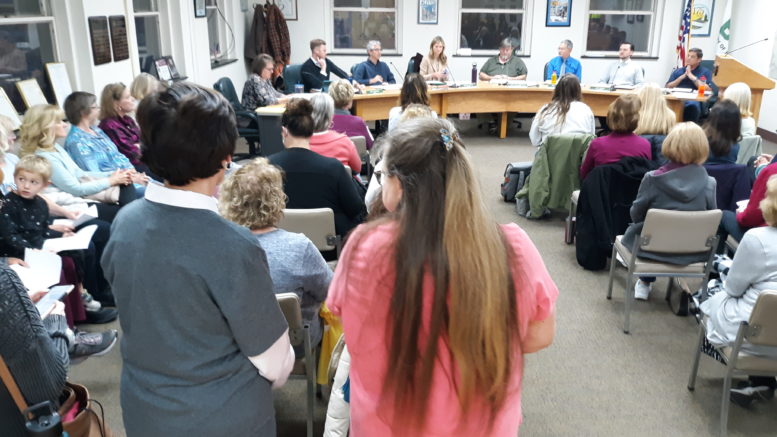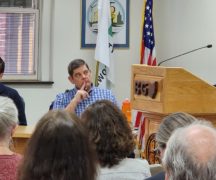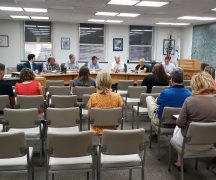By JAN LARSON McLAUGHLIN
BG Independent News
More than 150 people packed into the hallway and council chambers in Bowling Green Monday evening. They came to protest, support, and issue threats about the city’s proposed anti-discrimination amendment.
The amendment was born after the overturning of Roe v. Wade, when a group of suburban moms and college students reached out to City Council to create a safe haven in an unwelcome climate for reproductive rights.
Bowling Green City Council responded with an amendment to the city’s existing anti-discrimination ordinance.
The new section would add employment, housing and education protections of people’s reproductive decisions – whether they are getting an abortion or giving birth. It would make it illegal to discriminate against breastfeeding mothers, as well as pregnant people or those seeking to become pregnant.
The proposed amendment is modeled after an ordinance already adopted in Columbus.
The amendment to the anti-discrimination ordinance received its second of three required readings Monday evening. With a capacity of 66 in the council chambers, the majority of those attending the meeting had to listen over speakers in the hallway.
Council President Mark Hollenbaugh set the ground rules that each person had two minutes to speak – with some complying and some needing to be told multiple times to stop talking.
Of the 14 people speaking, 11 were opposed to the amendment, and three were in favor.
The first to speak was Peter Range, of Haskins, who is CEO of Ohio Right to Life. Range said he asked lawyers on his organization’s board to review the ordinance, and they found it to “unfairly target” pro-life pregnancy centers.
“Please do not pass it, for the sake of women here in Bowling Green,” he said.
Range cautioned that Missouri recently struck down a similar ordinance, and that Ohio Right to Life would challenge the amendment in Bowling Green.
Council member Nick Rubando asked why the organization hadn’t challenged the Columbus ordinance, which is already in place and which Bowling Green modeled its amendment on.
Range said Ohio Right to Life plans to challenge the ordinance in Columbus.
Eugene Canestraro, of Toledo, said he goes across the state litigating for Right to Life organizations. He called Bowling Green’s amendment “unconstitutional” by forcing Right to Life organizations to employ people that don’t adhere to the groups’ missions, for violating the First Amendment, and for getting rid of community anti-abortion services.
“This could be very costly to the city,” Canestraro said.
Rubando said Canestraro’s depiction of the amendment was inaccurate.
Canestraro said pregnancy centers would be forced to hire pro-choice people.
“That’s not what it says,” Rubando countered.
“That’s not what it says,” Canestraro conceded, but that is the spirit of the amendment, he added.
“This could be disastrous for the city,” Canestraro said.
“Is that a threat?” Rubando asked.
“Yes,” Canestraro answered.
Later in the meeting, Bob Cooley, of Bowling Green, said those in attendance aren’t threatening the city. “We’re just warning you because we love this community.”
But some in attendance felt the anti-discrimination amendment was good for the community. Lia Ricci, of Bowling Green, said the amendment is needed “to protect women regardless of their choices for their own health.”
“This seems sad to me that we are having those discussions in 2022,” she said.
Bowling Green officials often talk about decreasing the “brain drain” and being a community where BGSU students want to stay after graduation. This amendment will help that, said Ricci, a business owner.
“We must protect the women of our community,” she said. “This makes a statement to the women who are thinking about staying in this community.”
Several women who spoke had been assisted by the HerChoice pregnancy center or The Nest, which provides Christian childcare, both in Bowling Green.
Tiffany Crain, talked about the need for The Nest to be staffed only by Christians.
“We are a pro-life Christian ministry,” Crain said. “We will only hire those that serve our ministry.”
Rubando pointed out that the amendment does not apply to religious organizations.
Alora Drewes, of Perrysburg, shared her experience of finding out she was pregnant.
“I felt I had no one to turn to,” she said. But she found support at HerChoice and The Nest.
Debbie Keiser, of Cygnet, said she had an abortion and is now a volunteer at the pregnancy center, where she “experienced forgiveness.”
Morgan Reece, of the Falcons for Life organization at BGSU, asked why the city would want to pass an ordinance that would shutter such services – which is not in the ordinance.
“Why would we shut them down,” she asked.
A different perspective was presented by Elaine Bruckner, a clinical psychologist, who voiced her support for the amendment.
“This is protecting an individual’s right to make their own decisions regarding their body,” she said.
Bruckner said reproductive rights are a mental health issue, as well as a health issue. Decades of research cited by the American Psychology Association, shows harm to women’s mental health if they face discrimination of their reproductive rights.
But Sophia Jarrell, of Bowling Green, said the amendment is actually “discriminatory to pro-life people.” She asked if City Council members are personally prepared to provide childcare and other services.
Kim Lulfs, of Bowling Green, said she became pregnant when she was 18 – long before such an ordinance was suggested.
“I wasn’t protected back then, but I found a way to survive,” Lulfs said, adding that she has a 15-year-old child. “I didn’t abort her.”
Vicki Miles read aloud a letter from a client at HerChoice, who said she was welcomed and faced no judgment at the pregnancy center, which provided diapers and other supplies.
“This is a plea for their survival. The world is a better place,” because of the center, she said.
Wendy Cramer, of McClure, said she was traumatized for years by an abortion, but helped with items like diapers from the pregnancy center.
But Joseph DeMare said women will be mentally and physically traumatized when they have to turn to “back alley abortion clinics.”
DeMare, who is co-chair of the Wood County Green Party, said he first became involved in politics with the Right to Life cause. However, after working at a community college with a woman who told him of botched back alley abortions, DeMare changed his mind.
“The government should be protecting freedoms and protecting people,” he said.
Bowling Green City Council will hear the third reading of the proposed amendment at its next meeting on Nov. 7.





